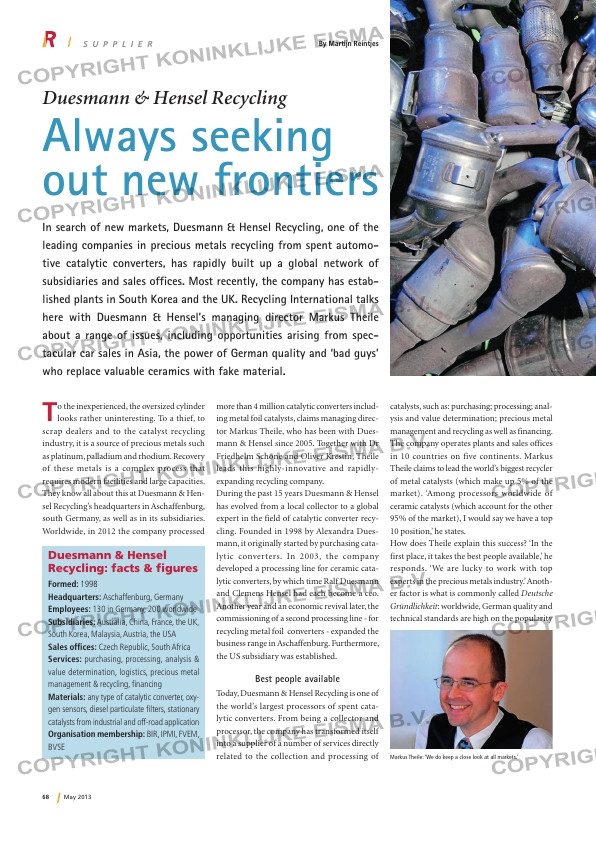Page 68 from: May 2013

68 May 2013
To the inexperienced, the oversized cylinder looks rather uninteresting. To a thief, to
scrap dealers and to the catalyst recycling
industry, it is a source of precious metals such
as platinum, palladium and rhodium. Recovery
of these metals is a complex process that
requires modern facilities and large capacities.
They know all about this at Duesmann & Hen-
sel Recycling’s headquarters in Aschaffenburg,
south Germany, as well as in its subsidiaries.
Worldwide, in 2012 the company processed
catalysts, such as: purchasing; processing; anal-
ysis and value determination; precious metal
management and recycling as well as financing.
The company operates plants and sales offices
in 10 countries on five continents. Markus
Theile claims to lead the world’s biggest recycler
of metal catalysts (which make up 5% of the
market). ‘Among processors worldwide of
ceramic catalysts (which account for the other
95% of the market), I would say we have a top
10 position,’ he states.
How does Theile explain this success? ‘In the
first place, it takes the best people available,’ he
responds. ‘We are lucky to work with top
experts in the precious metals industry.’ Anoth-
er factor is what is commonly called Deutsche
Gründlichkeit: worldwide, German quality and
technical standards are high on the popularity
Always seeking
out new frontiers
In search of new markets, Duesmann & Hensel Recycling, one of the
leading companies in precious metals recycling from spent automo-
tive catalytic converters, has rapidly built up a global network of
subsidiaries and sales offices. Most recently, the company has estab-
lished plants in South Korea and the UK. Recycling International talks
here with Duesmann & Hensel’s managing director Markus Theile
about a range of issues, including opportunities arising from spec-
tacular car sales in Asia, the power of German quality and ‘bad guys’
who replace valuable ceramics with fake material.
s u p p l i e r By Martijn Reintjes
Duesmann & Hensel Recycling
Duesmann & Hensel
Recycling: facts & figures
Formed: 1998
Headquarters: Aschaffenburg, Germany
Employees: 130 in Germany, 200 worldwide
Subsidiaries: Australia, China, France, the UK,
South Korea, Malaysia, Austria, the USA
Sales offices: Czech Republic, South Africa
Services: purchasing, processing, analysis &
value determination, logistics, precious metal
management & recycling, financing
Materials: any type of catalytic converter, oxy-
gen sensors, diesel particulate filters, stationary
catalysts from industrial and off-road application
Organisation membership: BIR, IPMI, FVEM,
BVSE
Markus Theile: ‘We do keep a close look at all markets.’
more than 4 million catalytic converters includ-
ing metal foil catalysts, claims managing direc-
tor Markus Theile, who has been with Dues-
mann & Hensel since 2005. Together with Dr
Friedhelm Schöne and Oliver Krestin, Theile
leads this highly-innovative and rapidly-
expanding recycling company.
During the past 15 years Duesmann & Hensel
has evolved from a local collector to a global
expert in the field of catalytic converter recy-
cling. Founded in 1998 by Alexandra Dues-
mann, it originally started by purchasing cata-
lytic converters. In 2003, the company
developed a processing line for ceramic cata-
lytic converters, by which time Ralf Duesmann
and Clemens Hensel had each become a ceo.
Another year and an economic revival later, the
commissioning of a second processing line – for
recycling metal foil converters – expanded the
business range in Aschaffenburg. Furthermore,
the US subsidiary was established.
Best people available
Today, Duesmann & Hensel Recycling is one of
the world’s largest processors of spent cata-
lytic converters. From being a collector and
processor, the company has transformed itself
into a supplier of a number of services directly
related to the collection and processing of
RI-4_Supplier.indd 68 03-05-13 14:16



